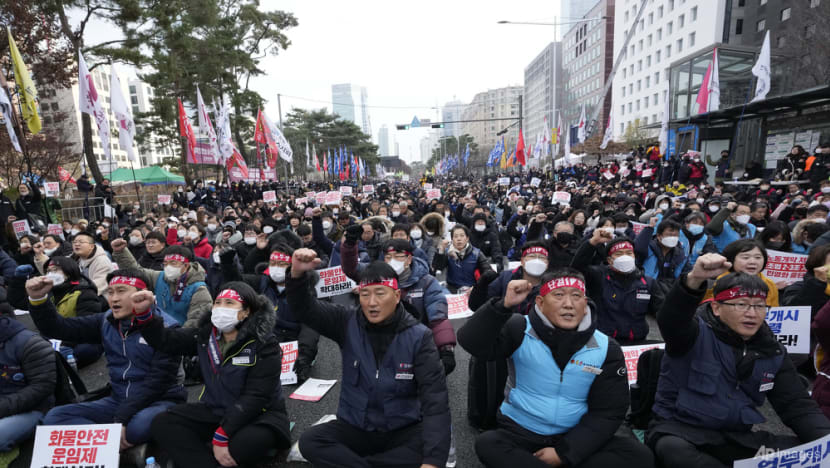Shipping delays, higher costs for Korean imports to Singapore due to South Korea truckers' strike
Thousands of cargo truck drivers in South Korea have been on strike for more than two weeks over a lack of progress on wage demands.

SINGAPORE: Businesses in Singapore are feeling the impact of South Korea's nationwide truckers’ strike, which has led to supply chain disruptions.
Thousands of cargo truck drivers in South Korea have been on strike for more than two weeks over a lack of progress on wage demands, with talks between workers and the government reaching a stalemate so far.
The strike has already disrupted supply chains and cost the country about 3.5 trillion won (US$2.6 billion) in lost shipments. It has also reduced shipments of petrochemicals overseas to about 5 per cent of normal levels.
Some Singapore businesses have reported lengthy shipping delays for Korean goods, forcing them to look for alternative supplies and driving up their costs and prices.
Korean restaurant Kko Kko Na Ra is among those affected by the disruptions. For instance, the cost of importing flower crabs, which are popular among its customers, continues to rise amid the ongoing truckers’ strike.
“We import flower crabs directly from Korea monthly,” said the eatery’s owner Eon Lee. “Because of high customer demand amid logistical delays, we had no choice but to import ingredients via air freight.
“The costs are very high, and we had to bear these additional costs, and sell our food items without any profit.”
But the restaurant may need to pass on the higher costs to customers if the mass strike drags on.
“If this problem persists, we might have to increase our prices by 20 to 30 per cent. We have no choice,” said Ms Lee.
“This isn't good for us, or our customers. So we are worried, and we hope the situation stabilises soon.”
STRIKES AFFECTING IMPORTS TO SINGAPORE
Besides food products, the strike has also affected other Korean imports to Singapore.
Koodshot, an online retail site that sells golf and tennis apparel brought in from Korea, has seen nearly a third of customers cancelling their orders due to delayed shipping.
Some Singapore customers who received their orders did so only after three to four weeks, said Koodshot owner Annabelle Bo Young Lee.
“We do want to deliver on time,” she said. “Every time there's a strike, we have really bad delays. There are delays for at least one to two weeks in Korea. So we've been handling very bad deliveries for the past few months.”
NO BREAKTHROUGH IN NEGOTIATIONS
Thousands of truck drivers, represented by the Cargo Truckers Solidarity union, have been on strike since Nov 24.
They are demanding that the South Korean government make the minimum-pay system known as the “Safe Freight Rate” permanent – and expand it not just to truck drivers for shipping containers and cement, but also to other industries such as steel, oil and chemical tankers and package delivery trucks.
The scheme is set to expire at the end of the year.
So far, there has been no breakthrough in negotiations. The government said the walkout is illegal and warned of tougher measures, but union members remained defiant and vowed to continue their struggle.
The striking truck drivers also have support from members of other unions.
On Dec 6, they were joined by about 20,000 members from the Korean Confederation of Trade Unions, one of the two umbrella union groups in the country.
At a rally, Mr Lee Bong Ju, head of the Cargo Truckers Solidarity, said they would not back down.
“We are left hanging on the edge of the cliff. And when we asked for negotiations, they refused,” he said. “We will never shamefully kneel to this government that is pushing us over. We will fight even if there is only one of us left standing.”
More rallies are expected in the coming days.
The impact of the strike on Asia’s fourth-largest economy has spilled over to other domestic industries.
Work at some construction sites across South Korea has been halted due to supply disruptions, and there are worries that this could expand to industries such as the petrochemical and steel sectors.
According to reports, about 80 gas stations across the country are running out of petrol due to the strike.
On Thursday, Seoul ordered striking truck drivers in the petrochemical and steel sectors to return to work - more than a week after a similar order was issued to cement truck drivers.
Truckers who fail to comply with the orders could face punishment of up to three years in jail or a maximum fine of about US$22,700.



















